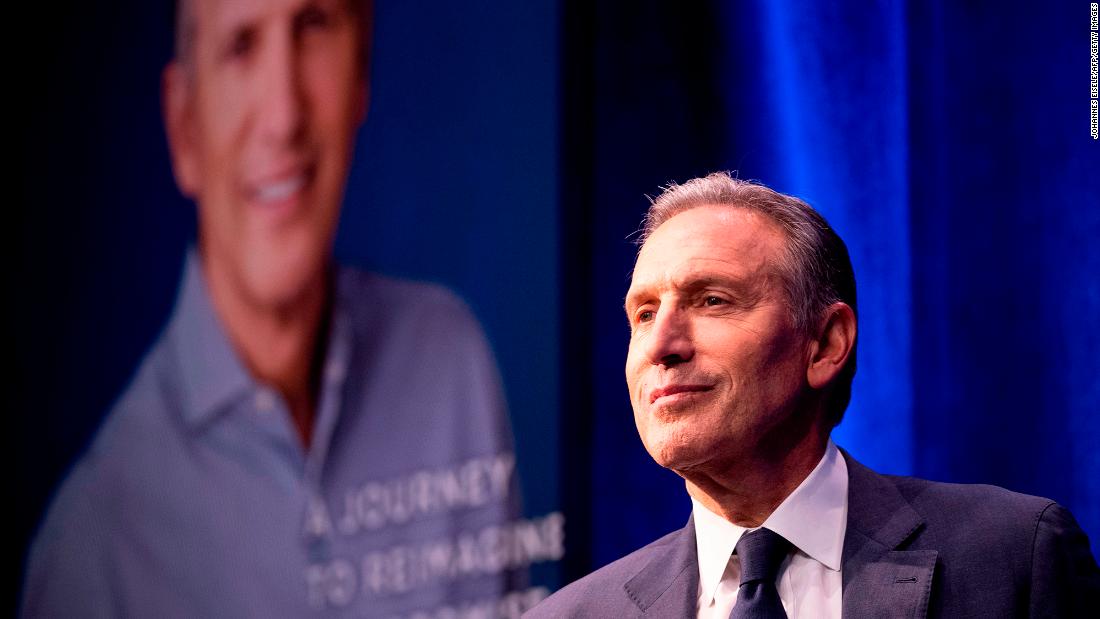Analysis: Starbucks needs a better leadership plan than Howard Schultz
Now Johnson is leaving, and Schultz is back as interim CEO to run the company and help find a permanent replacement, which the company expects to do by the fall. Schultz is also rejoining Starbucks’ board of directors.
The move is a head scratcher.
Johnson told the board about a year ago that he was considering retiring from the post “as the global pandemic neared an end,” so his exit doesn’t come as a shock. Indeed, the board engaged executive search firm Russell Reynolds Associates to help look for a new CEO last year, according to the company.
Schultz himself said “I did not plan to return to Starbucks,” in a statement discussing the move. But, he added, “when you love something, you have a deep sense of responsibility to help when called.” Schultz could not immediately be reached for comment for this story.
“Howard Schultz is a superstar CEO and founder,” said Sydney Finkelstein, a management professor at Dartmouth College’s Tuck business school, who also consults on senior executive hiring.
“His track record is tremendous. But this should not be happening.”
A shallow bench
Typically, once a corporate board learns that its chief executive is eyeing an exit, directors look internally and externally for a fitting replacement, said Charles Elson, founding director of the Weinberg Center for Corporate Governance at the University of Delaware. An internal candidate is preferable, he noted, because it’s less expensive and less disruptive. Tapping a former CEO for a second run — let alone a third — is not in the playbook.
“You’d think a company of that size would have a broader bench,” Elson said. “To bring in a twice-retired chair — it’s not the way you want it to end up.”
Elson sees it this way: The fact that Schultz left the job, twice, means there are good reasons for him not to be in the role. Why bring back someone who has already decided to leave?
Tapping Schultz suggests to Elson that the company doesn’t believe it has the right talent internally or, if it does, that person is not yet ready for the top job.
Starbucks declined to comment for this story, but pointed to statements made during the shareholder meeting in March.
“Succession is always at the top of any board’s agenda and the board has been working to advance our planning,” said board chair Mellody Hobson at the time. “The process is ongoing and yielding a strong slate of potential candidates,” she added. “As we take the time needed to select the right future leader, the board has asked Starbucks founder Howard Schultz to return as interim CEO.”
The pandemic may have slowed down the executive search, said Sara Senatore, restaurant analyst at Bank of America. Plus, Starbucks may see Schultz as having the right skillset to take on its challenges, she added. That includes convincing employees not to unionize.
“Reinvigorating the culture”
As CEO, Schultz was hailed for the employee benefits he set up, including healthcare coverage and tuition reimbursement for part-time workers. Starbucks still points to these as elements that set it apart from the competition and make the coffee chain a great place to work.
Schultz has been able to inspire feelings of camaraderie within Starbucks in the past, Senatore said.
“The thing that he’s always been known for is culture, and his ability to communicate … and to connect with partners,” she said. “To some extent, as the founder, he’s almost uniquely suited to do that.”
Hobson echoed that sentiment during the shareholder meeting, saying “we truly believe the company has and can continue to deliver far more in direct partnership with our people.” She added that “we hear the feedback and we are committed to finding new ways to enhance and elevate what we call the partner experience.”
But Schultz may not be able to persuade workers to stick to the status quo.
Starbucks has “been a leader on benefits and making a competitive package,” said RJ Hottovy, head of analytical research at Placer.ai, who has tracked the restaurant industry for years. But “there’s a lot of companies that have narrowed the gap, particularly during Covid.”
Plus the movement to unionize is bigger than Starbucks, noted Tuck’s Finkelstein.
A warning to future CEOs
Even if Schultz does manage to improve spirits at Starbucks while he’s there, his presence could send a negative message to potential hires in the future, Finkelstein said.
“If you’re a candidate for this job, one thing that’s going to be in the back of your head is, ‘the board is going to call Howard if something goes wrong.'”
That’s not a great feeling. And someone who is being considered to be the CEO of Starbucks would surely have other options — including at companies where the founder isn’t likely to take over at any moment, he noted.
The best CEO candidates “think really hard about what influence they’ll have over the board, and their ability to craft their own path for the strategy of the company [and] the direction of the company,” Finkelstein said.
The decision could have a chilling effect down the corporate ladder as well. Others considering whether to take executive roles at the company could see this as a deterrent, because they may hope to one day fill the CEO seat themselves.
“Howard Schultz coming back as the Savior again wouldn’t shock anyone if it happened,” Finkelstein said.
For all the latest world News Click Here

